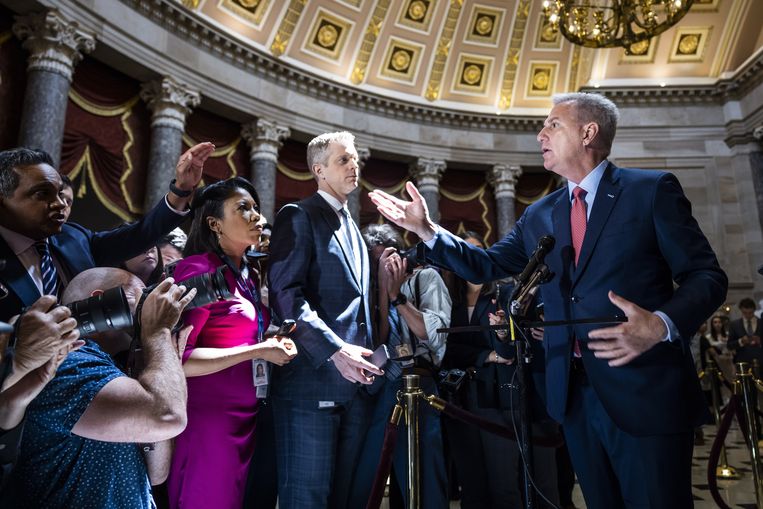Print $1 trillion in platinum currency, pay skyrocketing interest on super cheap debt, or let the central bank pull the coal out of the fire. This is how the US government can deal with a stupid and self-inflicted debt crisis.
It seems crazy to say that America can’t raise its debt ceiling in time because it would bankrupt one of the world’s richest countries. And that’s what’s going to happen.
On January 19, the US reached an arbitrary debt ceiling $31,381 billion You can’t add an extra dollar of debt over that. Bankruptcy has been averted for the time being thanks to the tactics of the Finance Ministry, which has, among other things, deferred contributions to government pension funds. But that stretch is not infinite. By the beginning of June the money would actually run out. In that case, the credit limit must have been increased, or there is not enough money to repay the government debt that is due.
About the author
Dan Balezir is an economics reporter D Volkskrant. He writes on financial markets and central banks. In Capital interest He explores exciting and significant economic events.
There is a statutory route for new costs. A Biden administration may invoke the 14th Amendment to the US Constitution, which provides for the “validity of the public debt of the United States.” […] Do not dispute.’ But that would guarantee a constitutional crisis, and the question is whether Biden feels it.
Other tactics to stave off bankruptcy are conceivable. For example, the US Federal Reserve can buy government bonds. The Federal Reserve already explored that scenario ten years ago, as it turns out Recently published conference call Since 2013, central bankers have also had to worry about the debt ceiling.
However, is it an option the central bank is willing to implement? The Fed’s current chairman, then-governor Jerome Powell, said at the time that such a move would be “scary” but acceptable “under certain circumstances.” He considered ambiguity an asset. If the central bank spelled out more clearly what to do about what and when, politicians would be under less pressure to actually raise the debt ceiling.
Although Janet Yellen was the Fed’s director ten years ago, and she attended that meeting, the Treasury secretary cannot be fully confirmed. Her ministry has other options to avoid bankruptcy.
For example, Yellen can use a Ambiguous law (which was actually intended to be commemorative) to mint $1,000 billion worth of platinum coins. If the Treasury Department pledges that currency to the Federal Reserve Bank, there will be enough money to pay the bills.
However, this strategy is not without risks. The central bank may reject the currency as it is clearly a political maneuver that raises serious doubts about the central bank’s independence.
And then there’s a better chance of another trick, because Jerome Powell and co can’t be hard about it. Debt limit It is necessary here to set a limit only for the outstanding government debt. Hence future obligations to pay interest are excluded.
This enables the government to issue bonds with a lower face value but a higher coupon. Instead of raising $100 in a 10-year bond at 3.6 percent, the government could offer a 15.6 percent interest rate on a $100 bond. Investors will then be willing to pay $200 (ie an issue of par). At those percentages, the yield to maturity is the same for both bonds.
Each time $100 comes in, the Treasury can sell $100 of new debt for $200, creating more room for spending and repaying it. It appears to be politically easier than the platinum coin because it is more difficult to understand. For example, the finance ministry may talk about a ‘temporary solution’ to avoid bankruptcy.
It is obviously not good for America’s credibility in the financial markets that the country has to fund accounting tricks. It is common sense that a solution will come in time. At the same time, if it was just common sense, that ridiculous debt ceiling wouldn’t exist because it’s about financing spending that the US Congress itself has authorized. It will be exciting days.

“Passionate analyst. Thinker. Devoted twitter evangelist. Wannabe music specialist.”







More Stories
Cooperation between the US and China ensures more stable corporate finance – FM.nl
New US peace proposal for Gaza war ‘may be too smart for either side to say no’
Bitcoin weathers bankruptcy storm in US